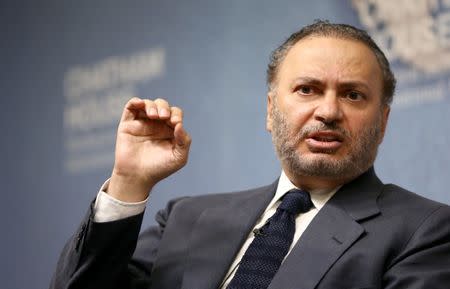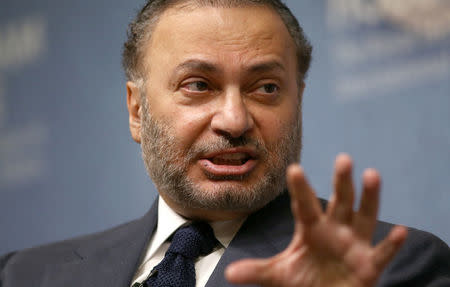Qatar says media report reveals UAE role in hack that sparked crisis
By Karin Strohecker and Tom Finn LONDON/DOHA (Reuters) - Qatar said on Monday that a U.S. media report had shown that the United Arab Emirates was involved in an alleged hack of Qatar's state news agency in late May that helped spark a diplomatic crisis in the Gulf. The UAE said the Washington Post report was untrue, and that four Arab powers were discussing imposing new sanctions on Qatar. Saudi Arabia, the UAE, Bahrain and Egypt all cut off diplomatic and transport ties with Qatar on June 5, accusing it of financing Islamist militant groups and allying with their regional adversary Iran - allegations Qatar denies. The move came two weeks after Qatar's news agency, QNA, carried a story quoting Qatar's emir, Sheikh Tamim bin Hamad al-Thani, as praising Gaza's ruling Islamist Hamas movement and calling Iran an "Islamic power". Qatar said its emir had never given the speech, and that the story had been planted electronically, but its allies were outraged, and one of the most serious feuds in years between Western-aligned Gulf states began. "The information published in the Washington Post on 16 July 2017, which revealed the involvement of the United Arab Emirates (UAE) and senior Emirati officials in the hacking of Qatar News Agency, unequivocally proves that this hacking crime took place," Qatar's government said in a statement on Monday. U.S. officials have said that experts from the Federal Bureau of Investigation (FBI) helping Qatar investigate the incident are convinced QNA was hacked, but that identifying the culprit will take time. In the meantime, Qatar's neighbors have banned its aircraft from their airspace, among other measures, and the wealthy natural gas producer has had to find alternative sources for the food imports on which it relies. Diplomatic efforts by Washington and Kuwait to broker a resolution have yielded little. HACKS "DISCUSSED IN MAY" The Washington Post cited unidentified U.S. intelligence officials as saying they had learned last week of newly analyzed information showing that top UAE officials had discussed the planned hacks on May 23, the day before they occurred. If confirmed, a hack of QNA would be a striking example of a cyber attack shaping global politics. The officials were quoted as saying it was unclear if the UAE had hacked the sites itself or paid for them to be hacked. Fellow Gulf states had already rejected Qatar's explanation and said Sheikh Tamim's reported remarks reflected deliberate ambiguities in Qatar's policies that have undermined stability in the region. "The Washington Post story today that we actually hacked the Qataris is also not true," UAE Minister of State for Foreign Affairs Anwar Gargash told the Chatham House think-tank in London. He said the four Arab powers were in the process of discussing additional sanctions on Qatar but did not elaborate, saying only that "there will be some tightening of the screws". Gargash said the UAE would not ask foreign companies to choose between doing business with it or Qatar, but suggested international monitoring of Qatar was needed. Egyptian Foreign Minister Sameh Shoukry told his Kuwaiti counterpart that the sanctions were being maintained "in light of what the quartet states see as Qatar's stalling and procrastination, and lack of concern for the concerns of the four states". The demands include Qatar curtailing its support for the Muslim Brotherhood, shutting down the pan-Arab satellite broadcaster Al Jazeera, closing a Turkish military base and downgrading relations with Iran. Qatar has for years parlayed its enormous gas wealth and Al Jazeera's reach into broad influence in the region, and in 2011 supported "Arab Spring" revolts across the Middle East. But its Gulf Arab neighbors and Egypt have long been irked by its support for anti-establishment movements and for the Islamist Muslim Brotherhood that briefly won power in Egypt, which they regard as a political enemy. (Additional reporting by Omar Fahmy; Writing by Jumana Fraije; Editing by Alison Williams)


